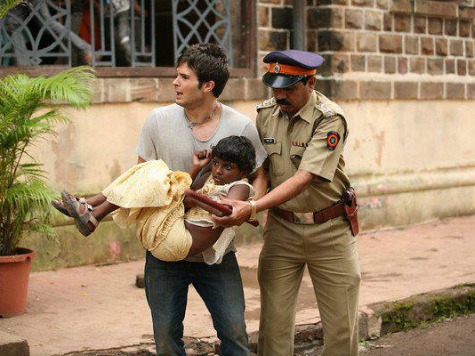The film Not Today opens in the beach house digs of actor Cody Longo’s character, Caden. Between shots with his college cadre, Caden lobs a dart at a map on the wall, and his buddies agree they’ll party that summer in Hyderabad, India.
But the real story–the one that led to making Not Today–starts not with a dart but a drainage pipe in Hyderabad. Make that an entire village of abandoned pipes, each concrete cylinder about six feet in diameter and housing a family or two.
My good friend, Matthew Cork, had invited me to India to meet and visit the schools our church helped build for Dalits, and we found ourselves at Pipe Village.Remember that word: Dalits. Rhyme it with shallots or with petites–you hear both.
The point is that India’s Dalits, 250 to 300 million people for centuries known as the “lowest of the low,” (imagine living under that label) have an almost 90-degree climb–culturally, economically, mentally–out of the slums and permanently makeshift towns where the vast majority wring livings as rat catchers, scavengers, rag pickers . . . oh, and as prostitutes and as young sex slaves and hopelessly indentured laborers caught in the multi-billion dollar global exploitation that Dalits are least able to resist.
It’s estimated that of India’s many trafficking victims, 90 percent are Dalits. And in the dank world of real people trapped, sold and worked with no hope, little Dalits as young as three or four find their entire lives reduced to being sex tools for a parade of anonymous adults.It can be hard to care for people far away and looking nothing like you. It can help to imagine a child you already love trapped for years and used to death.
As it happened, Matthew needed no help.
He was falling in love with the kids in the Pipe Village, astonishing him by speaking to him in English (English! India’s ticket up and out of intense poverty). “How is it possible?” Matthew asked. And his guide said,” “They learn it in your schools.”Now back to the movie.
Not Today is humanitarian entertainment–new purpose with your popcorn. This weekend or next, depending on when it’s at a theater within range, take a group and enjoy the story of a privileged young man in love with himself, who goes to India to party and eventually is freed to care about others.A good story, of course, does more than one thing. Matthew and I knew we had experienced something life-changing and before we knew it, back in Yorba Linda we were tapping into the local industry of moviemaking to build a case for Dalits and their kids.
That’s one level. Another level is entertainment. Another is conversation–that thing that happens over coffee after a story pulls you through an experience to a broader point of view.On the day that Roger Ebert died, an NPR report referred back to July 12, 2005, when the City of Chicago proclaimed Roger Ebert Day, and the legendary movie critic and human explained to a crowd why movies matter.
He said, “If it’s a great movie, it lets you understand a little bit more what it’s like to be a different gender, a different race, a different age, a different economic class. It helps us to identify with the people who are sharing this journey with us. And that to me is the most noble thing that good movies can do–and it’s a reason to encourage them and to support them and to go to them.”
I hope you’ll check in at the film’s official site and see it on the big screen.
Brent Martz is minister of creative arts at Friends Church in Yorba Linda and producer of Not Today, the first church-made film about a global issue releasing April 12.

COMMENTS
Please let us know if you're having issues with commenting.